-
 Bitcoin
Bitcoin $83,223.0034
-0.56% -
 Ethereum
Ethereum $1,841.7352
-1.98% -
 Tether USDt
Tether USDt $0.9998
0.02% -
 XRP
XRP $2.1826
2.70% -
 BNB
BNB $605.5995
-0.36% -
 Solana
Solana $125.7050
-0.65% -
 USDC
USDC $1.0000
0.00% -
 Dogecoin
Dogecoin $0.1708
-2.23% -
 Cardano
Cardano $0.6831
0.02% -
 TRON
TRON $0.2318
-0.96% -
 Toncoin
Toncoin $3.8464
3.26% -
 Chainlink
Chainlink $13.7063
-1.64% -
 UNUS SED LEO
UNUS SED LEO $9.6376
-0.78% -
 Stellar
Stellar $0.2699
0.53% -
 Avalanche
Avalanche $19.4968
-2.51% -
 Sui
Sui $2.4068
-1.50% -
 Shiba Inu
Shiba Inu $0.0...01267
-1.35% -
 Hedera
Hedera $0.1725
-1.30% -
 Litecoin
Litecoin $86.2879
-0.06% -
 Polkadot
Polkadot $4.1276
-0.51% -
 MANTRA
MANTRA $6.3657
2.20% -
 Bitcoin Cash
Bitcoin Cash $307.0668
-0.17% -
 Bitget Token
Bitget Token $4.6734
0.09% -
 Dai
Dai $0.9998
-0.02% -
 Pi
Pi $0.7854
-5.42% -
 Ethena USDe
Ethena USDe $1.0000
0.07% -
 Hyperliquid
Hyperliquid $12.6621
-1.05% -
 Monero
Monero $216.7582
-0.20% -
 Uniswap
Uniswap $6.0082
-2.09% -
 Aptos
Aptos $5.3105
-3.03%
What is a token issuance platform?
Choosing a token issuance platform requires considering factors like token functionality, target audience, budget, and crucially, security and compliance; understanding token standards (e.g., ERC-20, BEP-20) is also vital.
Mar 25, 2025 at 11:08 am
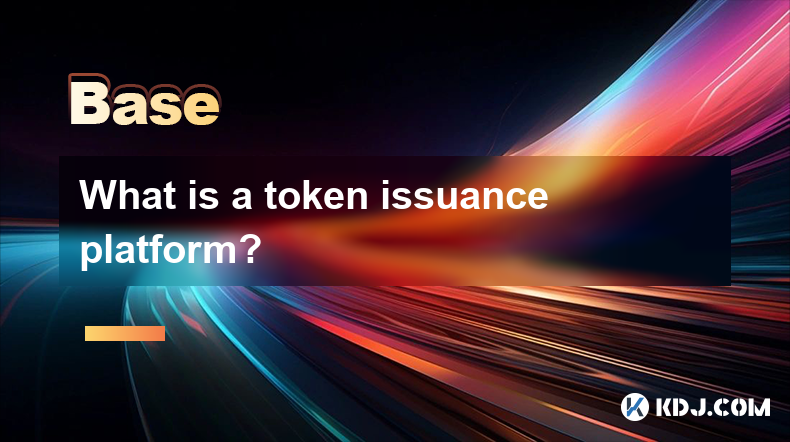
Key Points:
- Token issuance platforms are services that facilitate the creation and distribution of crypto tokens.
- These platforms offer varying levels of technical expertise and support, catering to different user needs.
- Choosing the right platform depends on factors like token functionality, target audience, and budget.
- Security and compliance are crucial considerations when selecting a token issuance platform.
- Understanding the different token standards (e.g., ERC-20, BEP-20) is vital for effective token creation.
What is a Token Issuance Platform?
A token issuance platform is essentially a service that provides the necessary tools and infrastructure for individuals or organizations to create and distribute their own crypto tokens. These platforms streamline the process, often handling the technical complexities involved in deploying a token on a blockchain. This simplifies the process for those without extensive blockchain development experience. The level of support and features offered can vary significantly between platforms.
Types of Token Issuance Platforms
Token issuance platforms cater to a diverse range of users, from individual developers to large enterprises. Some platforms are highly technical, offering granular control over every aspect of token creation, while others prioritize ease of use and a simplified interface. Many platforms offer varying levels of customization, allowing users to tailor their tokens to specific needs and functionalities.
Key Features of a Token Issuance Platform
A robust token issuance platform will typically offer several key features. These can include:
- Token Standard Support: Support for various token standards like ERC-20 (Ethereum), BEP-20 (Binance Smart Chain), and others. The choice of standard influences the token's functionality and compatibility with different wallets and exchanges.
- Smart Contract Deployment: Tools for easily deploying smart contracts, the underlying code that governs the token's behavior. This may include pre-built templates or custom development options.
- Token Distribution Management: Features for managing the distribution of tokens, including allocating tokens to different addresses, setting vesting schedules, and managing airdrops.
- KYC/AML Compliance Tools: Integration with Know Your Customer (KYC) and Anti-Money Laundering (AML) compliance tools, crucial for regulatory compliance, especially for larger token sales.
- Wallet Integration: Seamless integration with various crypto wallets, simplifying the process for users to interact with the newly created tokens.
Choosing the Right Platform
Selecting the appropriate platform requires careful consideration of several factors:
- Technical Expertise: If you lack coding experience, a user-friendly platform with pre-built templates is recommended. For more complex token functionalities, a platform offering custom development options may be necessary.
- Token Functionality: The desired functionality of your token will influence the platform choice. Some platforms are better suited for simple utility tokens, while others can handle more complex tokens with advanced features.
- Target Audience: The platform's user interface and documentation should be accessible to your target audience.
- Cost: Platforms offer various pricing models, ranging from free options with limitations to enterprise-level solutions with higher costs. Budget constraints should be a key consideration.
- Security: Thoroughly research the platform's security measures and track record. A secure platform is crucial to protect your tokens and user data.
Understanding Token Standards
Token standards define the technical specifications of a token, including its functionality and compatibility. Understanding the differences between standards is essential.
- ERC-20 (Ethereum): The most widely used standard, providing a common set of rules for fungible tokens on the Ethereum blockchain.
- BEP-20 (Binance Smart Chain): A similar standard to ERC-20 but built for the Binance Smart Chain, offering potentially lower transaction fees.
- Other Standards: Numerous other standards exist for different blockchains, each with its own advantages and limitations.
Security and Compliance Considerations
Security and regulatory compliance are paramount when issuing tokens.
- Smart Contract Audits: Before launching your token, consider getting your smart contracts professionally audited to identify and address potential vulnerabilities.
- KYC/AML Compliance: Ensure your platform and process comply with relevant KYC/AML regulations to prevent illicit activities.
- Data Security: Choose a platform with robust security measures to protect your users' data and prevent unauthorized access.
Common Questions:
Q: What are the costs associated with using a token issuance platform? A: Costs vary greatly depending on the platform and the services used. Some offer free plans with limitations, while others charge fees based on usage, features, or a subscription model.
Q: Are there any legal considerations when issuing tokens? A: Yes, token issuance is subject to various legal and regulatory frameworks, depending on your jurisdiction. Legal counsel is highly recommended to ensure compliance.
Q: How long does it take to issue a token using a platform? A: The timeframe depends on the complexity of the token, the platform's process, and any necessary audits or legal reviews. It can range from a few days to several weeks.
Q: What happens if there's a security breach on the platform? A: The consequences of a security breach can be severe, potentially leading to the loss of tokens or user data. Choosing a reputable platform with strong security measures is crucial.
Q: Can I issue any type of token on any platform? A: Not all platforms support all token types. Some platforms specialize in specific token standards or functionalities. Choose a platform that supports the type of token you want to issue.
Disclaimer:info@kdj.com
The information provided is not trading advice. kdj.com does not assume any responsibility for any investments made based on the information provided in this article. Cryptocurrencies are highly volatile and it is highly recommended that you invest with caution after thorough research!
If you believe that the content used on this website infringes your copyright, please contact us immediately (info@kdj.com) and we will delete it promptly.
- CFTC withdraws internal administrative guidance related to the digital asset derivatives market
- 2025-03-30 16:10:12
- IntelMarkets (INTL) Could Leave ADA and XRP Price in the Dust as It Gives Early Buyers 911% Return
- 2025-03-30 16:10:12
- The XRP Community Is Witnessing a Breakout Moment as Investor Enthusiasm for the $XPL Token
- 2025-03-30 16:05:12
- title: Bitcoin (BTC) Could Witness a Death Cross “in about one to two weeks”
- 2025-03-30 16:05:12
- BTFD Coin (BTC) - The Meme Coin Market is Buzzing, and This Protocol Promises Explosive ROI
- 2025-03-30 16:00:12
- Veteran market analyst Peter Brandt has spotted a troubling pattern in XRP's price chart—a head and shoulders top.
- 2025-03-30 16:00:12
Related knowledge
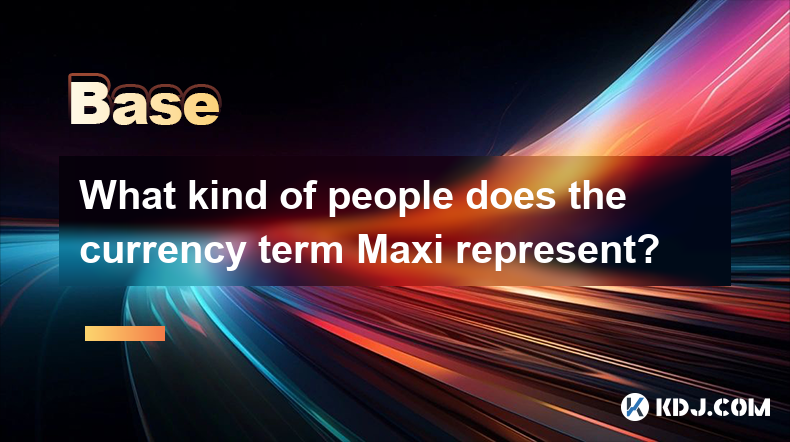
What kind of people does the currency term Maxi represent?
Mar 29,2025 at 08:49pm
Decoding the 'Maxi' in CryptocurrencyThe term 'Maxi' in the cryptocurrency world doesn't refer to a specific demographic or group with shared characteristics like age or profession. Instead, it's a label used to describe individuals holding a strong, often unwavering, belief in Bitcoin's dominance and superiority over all other cryptocurrencies. They a...
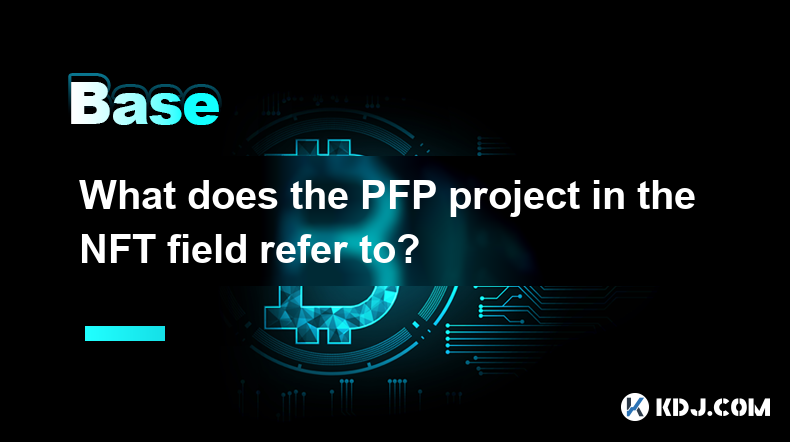
What does the PFP project in the NFT field refer to?
Mar 29,2025 at 07:42pm
Understanding Profile Picture (PFP) Projects in the NFT SpaceThe term 'PFP' in the NFT world stands for Profile Picture. These are NFT projects centered around unique digital avatars, often designed in a consistent artistic style, that users can set as their profile picture across various online platforms. Think of them as collectible digital trading c...
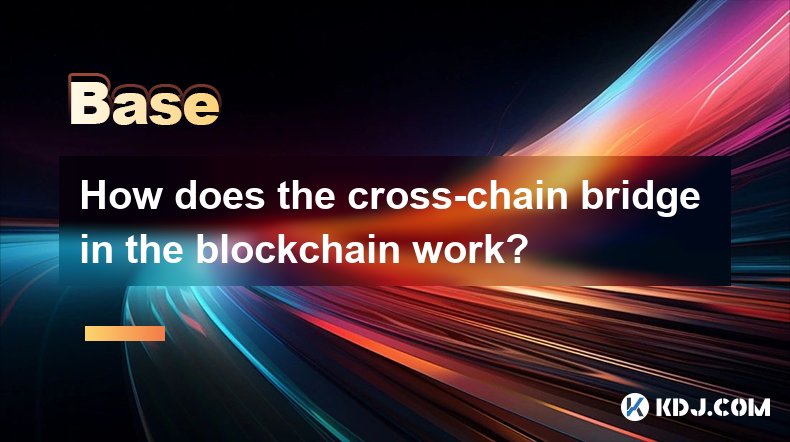
How does the cross-chain bridge in the blockchain work?
Mar 30,2025 at 05:14am
Understanding Cross-Chain Bridges in BlockchainCross-chain bridges are crucial infrastructure in the blockchain ecosystem, enabling the transfer of tokens and data between different blockchain networks. This functionality is essential because blockchains, while offering unique advantages, often operate in isolation. Bridges overcome this limitation, fo...
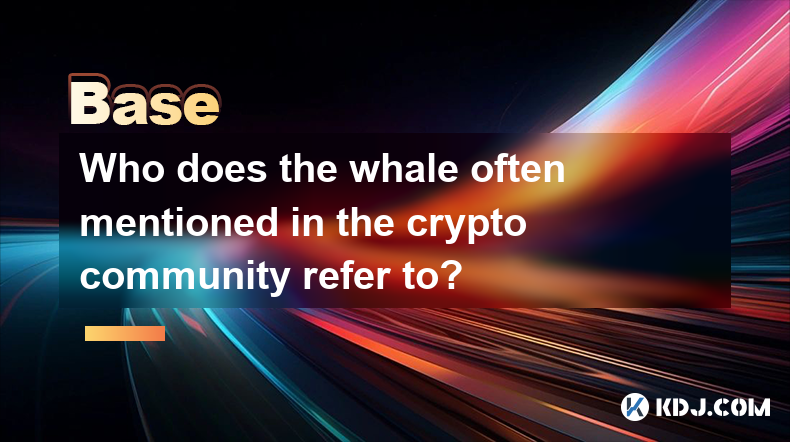
Who does the whale often mentioned in the crypto community refer to?
Mar 30,2025 at 07:21am
Understanding Crypto WhalesIn the cryptocurrency world, the term 'whale' refers to individuals or entities holding a significant amount of a particular cryptocurrency. This amount is usually large enough to influence the market price through their buying and selling activities. There's no single universally agreed-upon threshold, but generally, owning ...
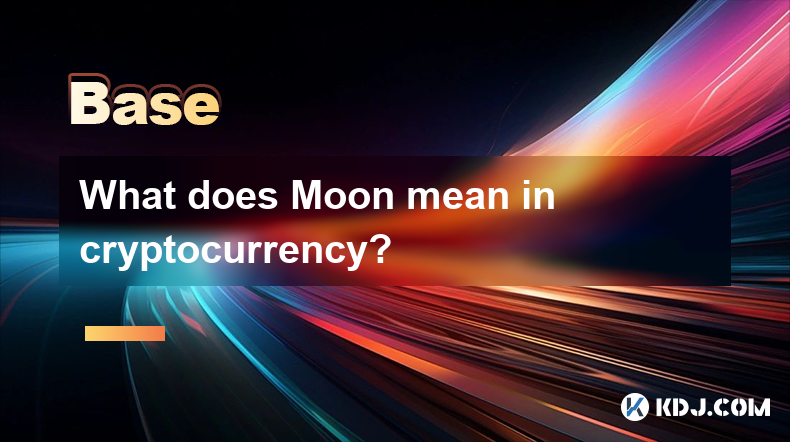
What does Moon mean in cryptocurrency?
Mar 30,2025 at 04:22pm
Decoding the Crypto Jargon: Understanding 'Moon'In the dynamic world of cryptocurrency, slang and jargon are commonplace. One term frequently used, especially on social media platforms and online forums, is 'moon.' But what does it actually mean in the context of cryptocurrency? Simply put, 'moon' refers to a significant and rapid price increase of a p...
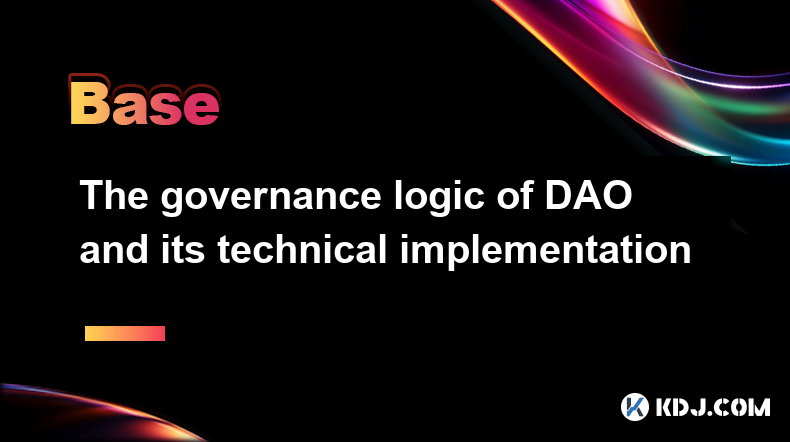
The governance logic of DAO and its technical implementation
Mar 29,2025 at 11:21am
Understanding Decentralized Autonomous Organizations (DAOs) and their GovernanceDecentralized Autonomous Organizations (DAOs) represent a novel organizational structure leveraging blockchain technology to automate decision-making processes. Unlike traditional organizations with centralized control, DAOs operate based on pre-defined rules encoded in sma...

What kind of people does the currency term Maxi represent?
Mar 29,2025 at 08:49pm
Decoding the 'Maxi' in CryptocurrencyThe term 'Maxi' in the cryptocurrency world doesn't refer to a specific demographic or group with shared characteristics like age or profession. Instead, it's a label used to describe individuals holding a strong, often unwavering, belief in Bitcoin's dominance and superiority over all other cryptocurrencies. They a...

What does the PFP project in the NFT field refer to?
Mar 29,2025 at 07:42pm
Understanding Profile Picture (PFP) Projects in the NFT SpaceThe term 'PFP' in the NFT world stands for Profile Picture. These are NFT projects centered around unique digital avatars, often designed in a consistent artistic style, that users can set as their profile picture across various online platforms. Think of them as collectible digital trading c...

How does the cross-chain bridge in the blockchain work?
Mar 30,2025 at 05:14am
Understanding Cross-Chain Bridges in BlockchainCross-chain bridges are crucial infrastructure in the blockchain ecosystem, enabling the transfer of tokens and data between different blockchain networks. This functionality is essential because blockchains, while offering unique advantages, often operate in isolation. Bridges overcome this limitation, fo...

Who does the whale often mentioned in the crypto community refer to?
Mar 30,2025 at 07:21am
Understanding Crypto WhalesIn the cryptocurrency world, the term 'whale' refers to individuals or entities holding a significant amount of a particular cryptocurrency. This amount is usually large enough to influence the market price through their buying and selling activities. There's no single universally agreed-upon threshold, but generally, owning ...

What does Moon mean in cryptocurrency?
Mar 30,2025 at 04:22pm
Decoding the Crypto Jargon: Understanding 'Moon'In the dynamic world of cryptocurrency, slang and jargon are commonplace. One term frequently used, especially on social media platforms and online forums, is 'moon.' But what does it actually mean in the context of cryptocurrency? Simply put, 'moon' refers to a significant and rapid price increase of a p...

The governance logic of DAO and its technical implementation
Mar 29,2025 at 11:21am
Understanding Decentralized Autonomous Organizations (DAOs) and their GovernanceDecentralized Autonomous Organizations (DAOs) represent a novel organizational structure leveraging blockchain technology to automate decision-making processes. Unlike traditional organizations with centralized control, DAOs operate based on pre-defined rules encoded in sma...
See all articles





















































































